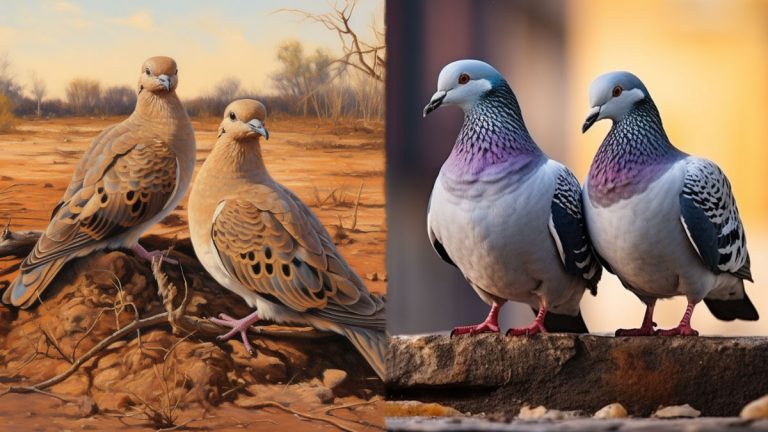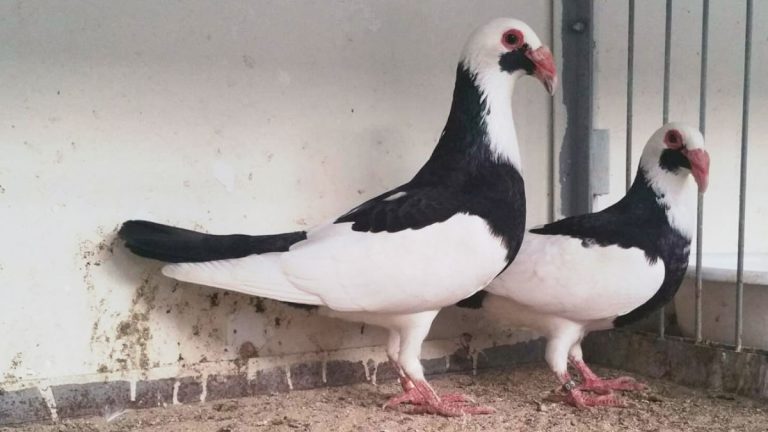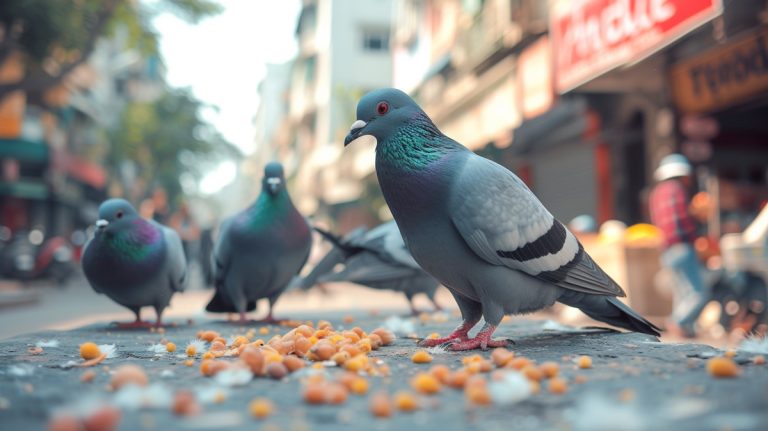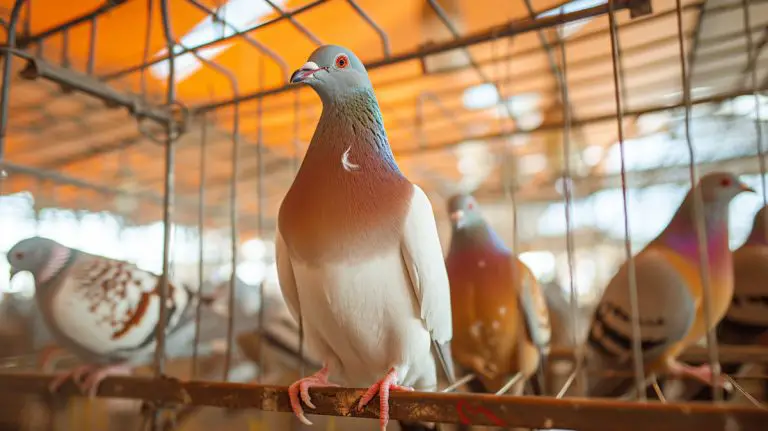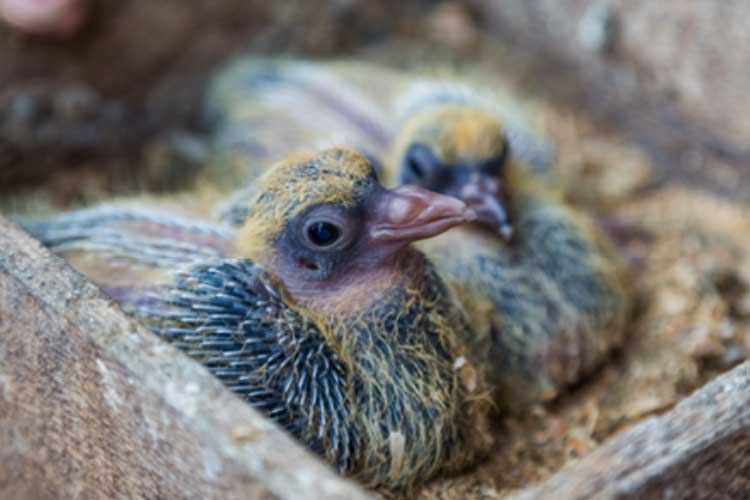Foods to Avoid for a Pigeon: Chocolate, Caffeine & More
Pigeons are fascinating creatures that have adapted to urban environments, often finding their way into our lives. Whether you’re a bird enthusiast or simply have a soft spot for these feathered friends, it’s important to know what foods to avoid feeding them. As an experienced bird lover, I’ll guide you through the foods that can be harmful to pigeons and should be kept out of their diet. By understanding what to avoid, we can ensure the well-being and health of these beautiful birds.
When it comes to feeding pigeons, it’s crucial to remember that not all foods are suitable for their delicate digestive systems. While it may be tempting to share your leftovers or snack on the go, certain foods can have adverse effects on pigeons’ health. In this article, I’ll highlight some common foods that should be avoided when feeding pigeons, and explain the reasons behind it. By being mindful of what we offer these birds, we can play a role in their overall well-being and contribute to their thriving presence in our urban landscapes.
Harmful Foods for Pigeons
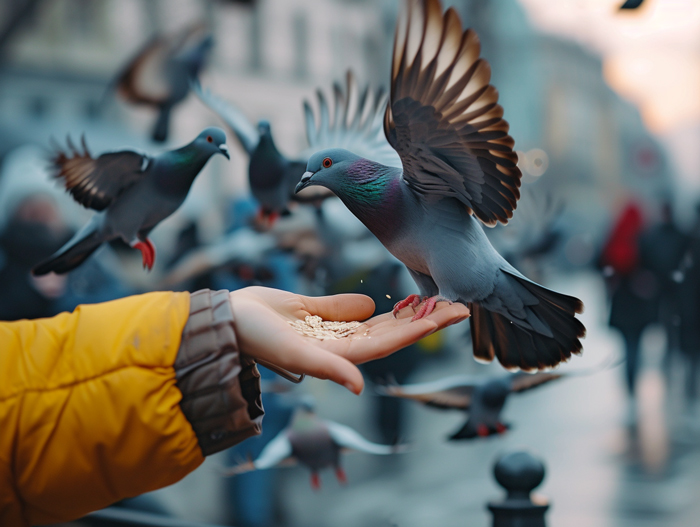
As I mentioned earlier, it’s important to be mindful of what we offer pigeons to ensure their well-being and health. While pigeons are adaptable birds, there are certain foods that can be harmful to their delicate digestive systems. Let’s take a closer look at some of these foods that should be avoided:
- Bread and Baked Goods:
Contrary to popular belief, bread is not a suitable food for pigeons. While they may enjoy eating bread, it lacks the essential nutrients they need for a balanced diet. Additionally, feeding pigeons too much bread can cause malnutrition and digestive issues. - Junk Food:
I’m sure you’ve seen people feeding pigeons with chips, cookies, or other junk foods. While these may be tempting treats for humans, they are definitely not suitable for pigeons. These types of foods are high in salt, sugar, and unhealthy fats, which can lead to obesity and other health problems for our feathered friends. - Dairy Products:
Milk, cheese, and other dairy products should be avoided when feeding pigeons. Pigeons are unable to properly digest lactose, the sugar found in milk, which can lead to digestive discomfort and diarrhea. - Avocado:
While avocados may be a trendy and healthy food for us, they can be toxic to pigeons. Avocado contains a compound called persin, which is harmless to humans but can be toxic to birds. - Onions and Garlic:
Pigeons are sensitive to onions and garlic. These foods can cause digestive issues and can even damage their red blood cells if consumed in large quantities.
By understanding which foods are harmful for pigeons, we can make sure to avoid offering them these items. Instead, we should focus on providing them with a balanced diet of seeds, grains, fruits, and vegetables that meet their nutritional needs.
Bread: An Unhealthy Snack
When it comes to feeding pigeons, it’s important to be mindful of what foods we offer them. While it may be tempting to give them bread, it’s actually an unhealthy snack that can have negative effects on their health.
Here are a few reasons why bread should be avoided as a food option for pigeons:
- Lack of Nutritional Value: Bread is low in essential nutrients that pigeons need for their overall well-being. It is primarily made of refined grains, which lack key vitamins and minerals.
- Digestive Issues: Pigeons’ digestive systems are not designed to properly process bread. The high carbohydrate content and lack of fiber can lead to digestive discomfort and potentially even digestive blockages.
- Malnutrition: Feeding pigeons bread can lead to malnutrition. Since bread is not a balanced source of nutrition, pigeons may not be getting the necessary nutrients they need to stay healthy and thrive.
- Obesity: Bread is often high in calories and lacking in beneficial nutrients. Feeding pigeons bread regularly can lead to weight gain and obesity, which can have a negative impact on their overall health.
- Unwanted Behavior: Feeding pigeons bread can encourage them to become dependent on humans for food. This can lead to overpopulation, as well as unwanted behaviors such as aggressive begging, fighting, and even property damage.
Instead of bread, it’s important to provide pigeons with a balanced diet that meets their nutritional needs. This can include a variety of seeds, grains, fruits, and vegetables. By offering them a diverse range of foods, we can ensure that pigeons stay healthy and well-nourished.
Avoiding bread as a snack not only benefits pigeons, but it also helps to promote a more sustainable and responsible approach to wildlife feeding. By being mindful of the foods we offer pigeons, we can contribute to their overall well-being and create a healthier environment for both the birds and ourselves.
Salty and Processed Foods: A No-No
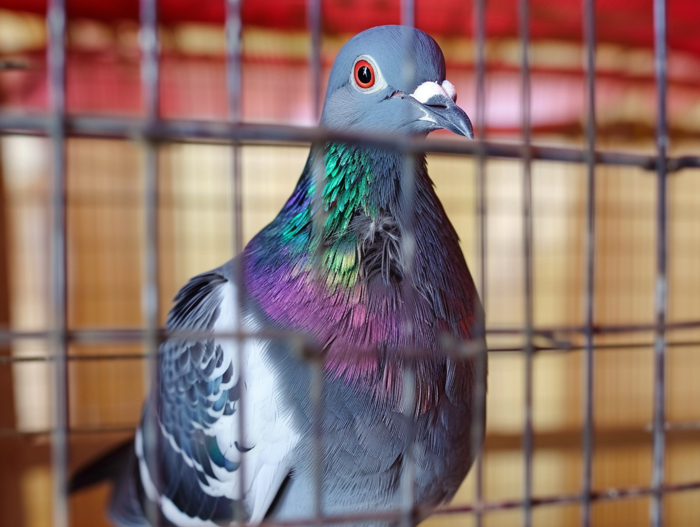
When it comes to feeding pigeons, it’s important to be mindful of not only the foods we offer but also the quality of those foods. Salty and processed foods may be tempting, but they should be avoided when feeding pigeons. Here’s why:
High Sodium Content
Salty foods like chips, pretzels, and processed snacks are not suitable for pigeons. These foods are often high in sodium content, which can be harmful to their health. Pigeons have specific dietary needs that require a balanced intake of nutrients, and excessive sodium can disrupt their well-being.
Negative Impact on Digestion
Processed foods are often loaded with additives and preservatives that can have a negative impact on a pigeon’s digestive system. These foods may be difficult for them to break down, leading to digestive issues such as stomach discomfort or diarrhea. In order to maintain their digestive health, it’s best to stick to natural, unprocessed options.
Lack of Nutritional Value
Another reason to avoid salty and processed foods is their lack of nutritional value. These foods are typically low in essential nutrients that pigeons require for optimal health. By feeding them foods with little nutritional value, we fail to provide them with the necessary vitamins and minerals they need to thrive.
Encourages Unhealthy Behaviors
Feeding pigeons salty and processed foods can also encourage unhealthy behaviors. Pigeons may become dependent on humans for these foods and may start to rely on them as their primary source of nutrition. This can lead to an unbalanced diet and malnutrition in the long run.
To ensure the well-being of pigeons, it’s best to avoid salty and processed foods altogether. Instead, focus on providing them with a balanced diet of seeds, grains, fruits, and vegetables that meet their nutritional needs. By making these choices, we can promote a healthier and more responsible approach to feeding our feathered friends.
Chocolate and Caffeine: Danger Alert!
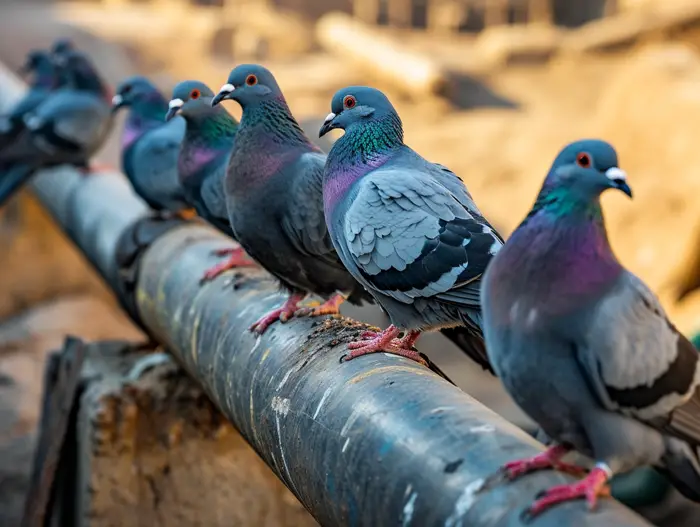
When it comes to feeding pigeons, there are certain foods that should never be on the menu. Two of the biggest culprits are chocolate and caffeine. These seemingly innocent treats can actually pose a serious risk to our feathered friends. Let’s take a closer look at why chocolate and caffeine should be avoided at all costs.
- Chocolate: While we humans may enjoy indulging in chocolate treats, it’s important to remember that chocolate contains a substance called theobromine. This compound is toxic to pigeons and can have severe consequences if ingested. Theobromine affects the pigeon’s nervous system and can lead to symptoms such as muscle tremors, increased heart rate, and in extreme cases, even death. It’s best to keep all forms of chocolate away from pigeons to ensure their safety.
- Caffeine: You may rely on your morning cup of coffee or tea to jump-start your day, but caffeine can have detrimental effects on pigeons. Similar to chocolate, caffeine affects the pigeon’s nervous system and can lead to serious health issues. It can cause increased heart rate, restlessness, and even cardiac problems. While it may be tempting to share a sip of your favorite caffeinated beverage with a pigeon, it’s essential to resist the urge and stick to safe food options.
It’s crucial to remember that pigeons have different dietary needs than humans. While we may enjoy the occasional chocolate or caffeine fix, these substances can have detrimental effects on our feathered friends. By avoiding chocolate and caffeine altogether, we can help ensure the well-being and health of pigeons in our vicinity.
In the next section, we will explore another food that should be avoided when feeding pigeons: alcohol. Stay tuned for the potential dangers it poses and why it should never find its way into a pigeon’s diet.
Seeds and Nuts: Not Ideal for Pigeons
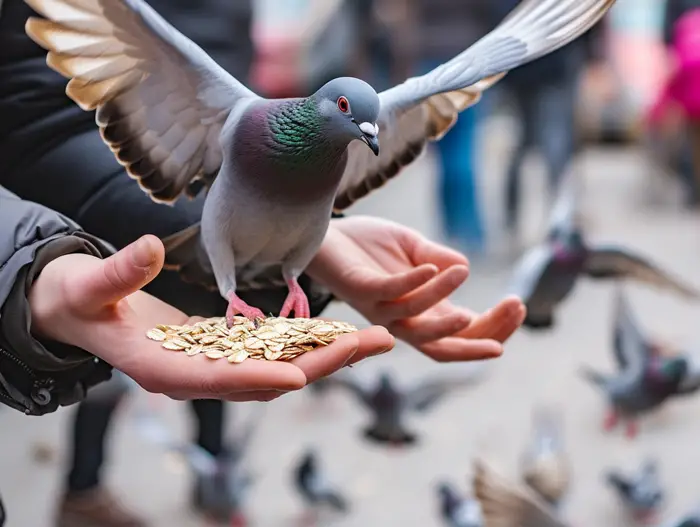
When it comes to feeding pigeons, it is important to remember that not all foods are suitable for them. While we may enjoy snacking on seeds and nuts, these items are actually not ideal for our feathery friends. Here’s why:
1. Digestive System: Pigeons have a unique digestive system that is specifically designed for their natural diet. Their bodies are adapted to process grains and plant material, making it easier for them to extract the necessary nutrients. Seeds and nuts, on the other hand, can be harder for pigeons to digest properly.
2. Choking Hazard: Pigeons have small beaks, which makes it difficult for them to break down large and hard food items. Seeds and nuts, especially those with shells, can pose a choking hazard for these birds. The risk of choking is not something we want to subject them to.
3. Unbalanced Nutrition: While seeds and nuts may be rich in fats and protein, they lack some of the essential nutrients that pigeons need for optimal health. A diet solely comprised of these items can lead to nutritional imbalances and deficiencies, ultimately affecting the well-being of our pigeon friends.
To ensure the health and well-being of pigeons, it is best to avoid offering them an abundance of seeds and nuts. While it may be tempting to share our snacks with them, it is important to remember that their dietary needs are different from ours. Providing a balanced diet that includes grains, fruits, and vegetables will ensure that they receive all the necessary nutrients for a healthy life.
So, the next time you are out and about and encounter pigeons, remember to avoid giving them seeds and nuts. Instead, opt for pigeon-specific feed or appropriate grains and vegetables. By making this small adjustment, we can contribute to the overall well-being of these amazing creatures.
Conclusion
It is crucial to be mindful of the foods we offer pigeons to ensure their well-being and health. Two specific foods that should be avoided at all costs are chocolate and caffeine. These substances contain compounds that are toxic to pigeons and can have severe consequences if ingested. Pigeons have different dietary needs than humans, so it is essential to keep all forms of chocolate and caffeine away from them to ensure their safety.
Additionally, seeds and nuts are not ideal for pigeons due to their unique digestive system, the risk of choking, and the lack of essential nutrients. Instead of offering an abundance of seeds and nuts, it is recommended to provide a balanced diet that includes grains, fruits, and vegetables. By making this adjustment, we can contribute to the overall well-being of pigeons.
Remember, pigeons rely on us to provide them with the right nutrition. By avoiding these harmful foods and offering a balanced diet, we can help ensure that pigeons stay healthy and thrive in their environment. Let’s prioritize their well-being and make informed choices when feeding them.

